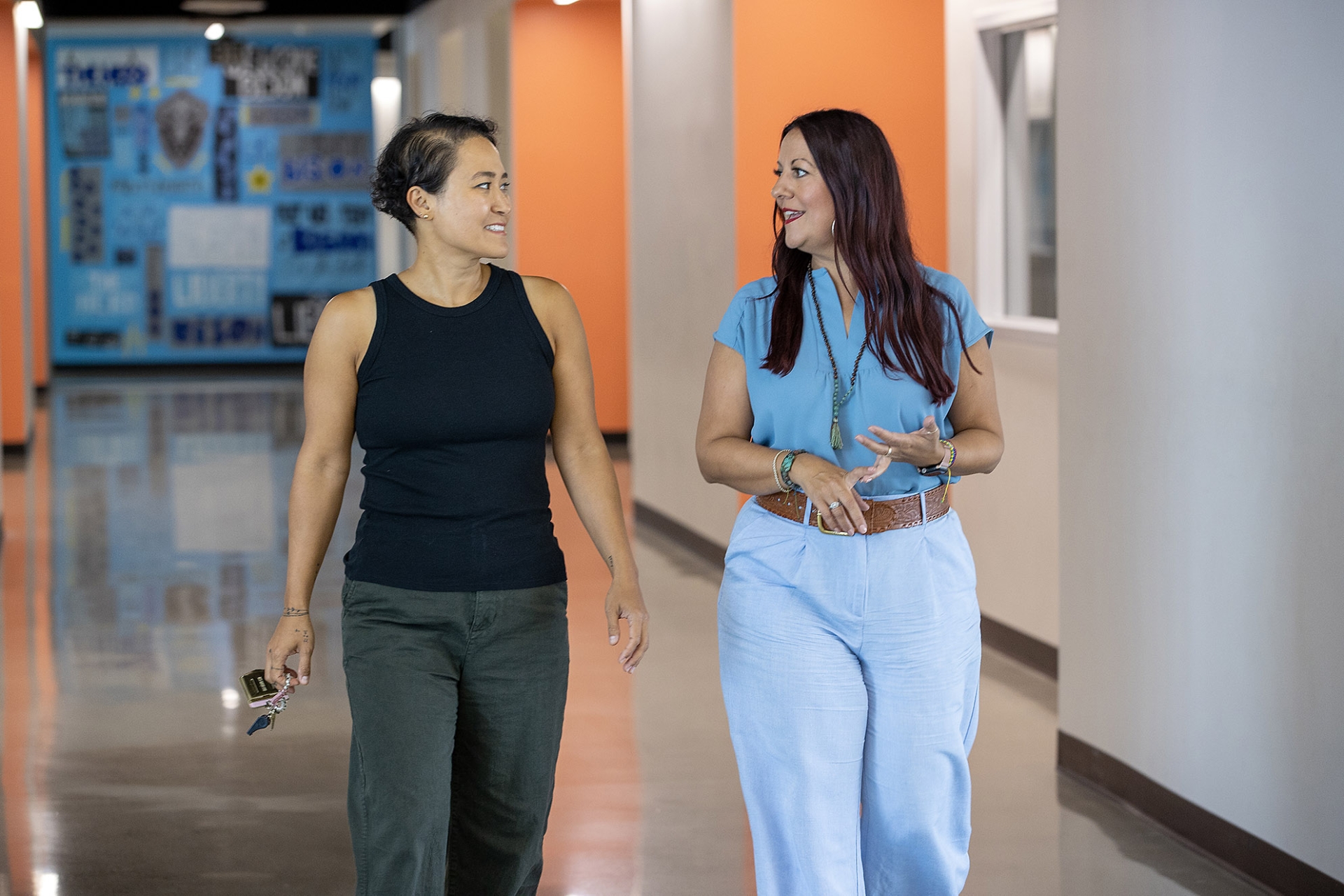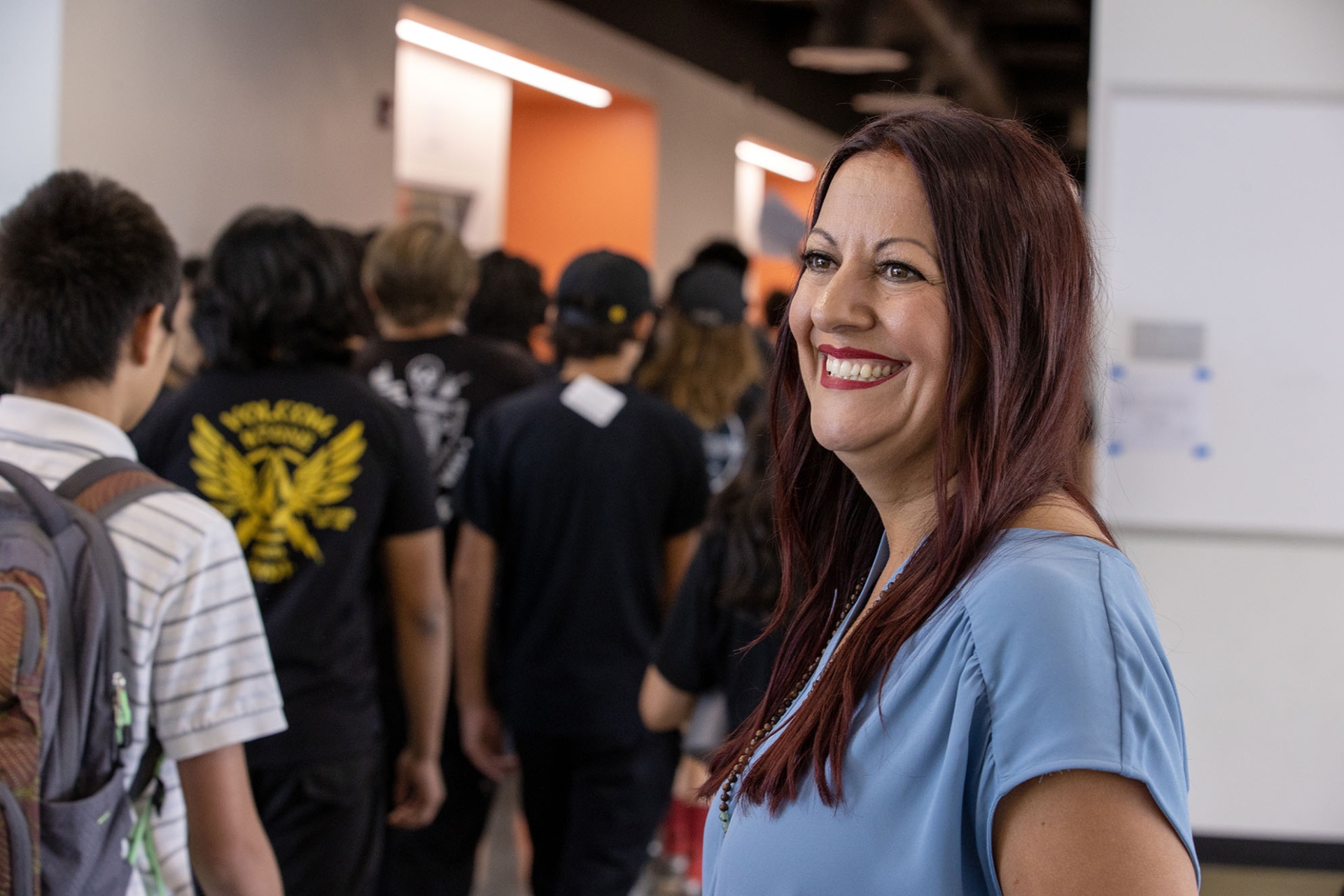Alan Llavore | Office of Strategic Communication | (909) 537-5007 | allavore@csusb.edu
As a student at Perris High School during the 1990s, CSUSB alumna Erika Tejeda, B.A. Spanish, ’01, M.A. educational administration, ’13, Ed.D. educational leadership, ’22, hated high school.
“I had such a bitter taste in my mouth because of my high school experience. There weren’t any meaningful relationships. There wasn’t any mentorship. There wasn’t a lot of guidance,” she recalled.
She took the lessons she learned there, and over the course of her career has made it her mission to change the high school experience for future students. “That’s what drives me now as a teacher and as a principal — it’s to have those relationships, to have that impact and to be human to our kids,” she says.
Today, she is the principal of Liberty High School in the Perris Union High School District (PUHSD), a position she’s held since 2021.
Her dedication and commitment to her students was recently recognized when she was named Principal of the Year by the Association of California School Administrators (ACSA) out of more than 4,000 high school principals in California. Tejeda will be honored as Principal of the Year at the ACSA Leadership Summit Statewide Awards Ceremony, Nov. 3 in Sacramento.
Each year, ACSA honors educational leaders who strive to create and support equitable educational opportunities for California students. She is the first principal from the PUHSD to be honored with the award — the same district where she attended high school.
Tejeda, 46, the youngest of five children, was the first in her family to attend college. She credits her parents – her mother from a family of agricultural workers, her father, an immigrant from Mexico — for instilling in her a respect for the importance of education and hard work.
“My parents sacrificed a lot,” she said. “We all went to Catholic school, kindergarten through eighth grade. My parents wanted to give us the best foundation they could.”

She worked three jobs in high school to pay for “extras” and ease the burden on the family. After graduating from high school, her mother encouraged her to get a full-time job right away, rather than spending time with her friends that summer at the beach.
Thus began her lifelong career in education. She became a crossing guard for the elementary school district, and as time went on, was promoted to a playground supervisor, then a bilingual aide, then a bilingual clerk typist, and then a secretary. During this time, she got married, had a daughter, got divorced, attended San Jacinto Community College and earned an associate degree. She later remarried, had two more children, and eventually became a single mother.
“In community college, I remember thinking, ‘Oh my God, I don’t belong here.’ If there was a word I didn’t understand I would write it down, and then I’d look it up later in the dictionary. There was such a lack of agency. I didn’t know the system,” she recalled.
When she arrived at Cal State San Bernardino in 1997, she said, “I was terrified. I didn’t know if I’d fit in. I had such a lack of confidence. I knew I wanted better for myself. In my heart, I was determined my daughter and I weren’t going to be statistics. I didn’t want my daughter to be the child of a college dropout. I needed to do better for us,” she said.
After earning her B.A. in Spanish in 2001 at age 23, she continued her job as a secretary with the Perris Elementary School District, eventually being promoted to community liaison for the district. But her passion was always to teach.
In 2003, she began working toward her master’s degree in education and a single-subject credential at National University. She reached out to her former high school principal to let him know she’d like to teach Spanish if a position ever became available. Soon after, he contacted her and asked if she was interested in a teaching position at Paloma Valley High School.
"I’m very passionate about building relationships with students, teachers and staff in general. I really believe it comes from the top down. We have to model our expectations, but we also have to model relationships and how to treat others."
Erika Tejeda
She became the Spanish teacher, taught AP Spanish and became the school’s activities director, attending games and events on weekends, daughter in tow.
A new opportunity arose to assist with the opening of Heritage High School in Menifee, where she transferred as a Spanish teacher. After several years, she transferred to her alma mater, Perris High School, as a Spanish teacher, and eventually, became an assistant principal.
“My goal was to go back to my alma mater and to give back to my community for people who looked like me. I told them, ‘If I can do it, you can do it. Let me help you navigate the system.’ It was so important to me to give back to the school I came from.”
It was also important to her to continue her academic career. She returned to CSUSB and earned her master’s in educational administration in 2013, followed by her doctorate in educational leadership in 2022.
“I’ve always had this passion. When I was in my twenties, I said I would earn my doctorate by the time I was 50, so at 46 I’m a little ahead of schedule,” she laughed.
When she began her doctoral program, she was alarmed, and then motivated, by a UCLA study that focused on the educational attainment of various ethnic groups.
“The study followed people by nationality, beginning in kindergarten, breaking down the Latino population to Salvadoran, Guatemalan, Mexican, Chicano and so on. I identify as a Chicana,” she said. “I learned that less than 0.1% of Chicanos in this study went on to earn their doctorate. I wanted to find out why.”
Her dissertation “Chicana/Latina Secondary Administrators: Triumphs, Obstacles, and Discernment ¡Si Se Pudo!” explores the difficulties that Latina leaders face that begin within the K-12 school pipeline, and the persistent obstacles they encounter through practices of employment, hiring, retention and support of school leaders of color.

“There is a lack of representation and lack of mentorship for (Latinas) in the workplace. I didn’t have anybody who looked like me sponsor me or mentor me. (CSUSB) Professor Angela Louque has been instrumental in my education – she encouraged me and mentored me as the chair of my dissertation committee, but there were no women of color in the realm of my job to help me,” she noted. “Earning my doctorate made me want to advocate more for women and for women of color and to be available as a mentor.”
Today, in her role as principal of Liberty High School, and as the ACSA Principal of the Year, she is keenly aware of her position as mentor and role model.
“I’m very passionate about building relationships with students, teachers and staff in general. I really believe it comes from the top down. We have to model our expectations, but we also have to model relationships and how to treat others. I’m a true believer in the saying, ‘Treat others the way you want to be treated.’ I also treat students the way I want my own children to be treated. Parents send us the best they have. Treating kids with dignity and respect and listening is important,” she emphasized.
She is equally passionate about the faculty and staff at the school. “Liberty (High School) is beautiful in the sense that we encourage collaboration and cross-curricular methodologies. And it’s important to treat teachers as the professionals that they are. If we look at all the education teachers have completed, from their bachelor’s to their master’s and their credentials, they’re truly experts in their fields. It’s intense training. And our teachers are at the frontline of setting the foundation for our future and our children’s futures. We have to support our teachers, treat them with respect and encourage them.”
Tejeda has already attained many of her lifelong educational goals: becoming a teacher, educator and administrator, returning to the high school she herself attended to become an assistant principal in order to affect change, and defying the odds to earn a doctorate. What’s next? “Eventually I would love to teach at CSUSB and be part of the administrative credentialing program or the teacher credentialing program and share real world experience. I think it’s important to have people that are currently in the field sharing that knowledge.”